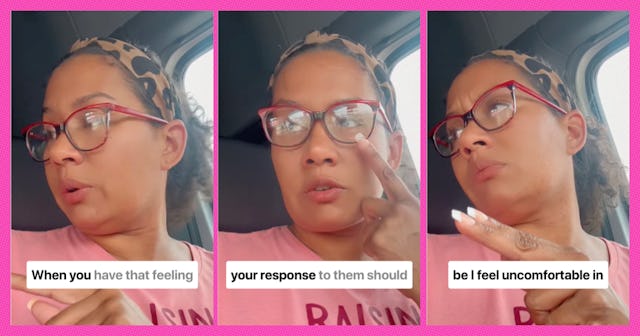Here’s How To Teach Kids To Speak Up When They're Uncomfortable
“Choose your discomfort, and choose the one that's going to help you, not hurt you.”

You know that face you make when you’re stuck in a conversation you absolutely would rather not be in? Your brain is screaming at you to leave, but you keep a polite smile, trying to look for any exit, trying not to come off as rude — but the end just never seems to arrive.
We often try to teach kids how to avoid inappropriate or uncomfortable conversations, but we can’t know for certain that they won’t end up in one. It’s easy to feel “trapped” in an unwanted conversation. So, when Charisse Sims’ 9-year-old daughter found herself in that very situation, she taught her exactly how to get out of it.
“Immediately, when she started having that conversation, I could see on your face that you felt uncomfortable,” Sims said to her daughter in an Instagram Reel. “When you have that feeling, your response to them should be, ‘I feel uncomfortable in this conversation. Let's talk about something else.’”
Sims had her daughter practice repeating the phrase back to her a few times, and asked her if she felt uncomfortable saying it. She said yes — and honestly, who wouldn’t be?
“Which one is a longer discomfort, taking 10 seconds to say, ‘I feel uncomfortable in this conversation. Can we talk about something else?’” Sims asked. “Or, sitting in a 20, 30 minute conversation that you feel uncomfortable in?”
Woah. Writing that one down for my own personal use, TBH.
Kids (and even adults) can end up stuck in uncomfortable situations out of fear of making it even more awkward by speaking up. But, we have to change our mindsets and remind ourselves that the discomfort of speaking up is only temporary.
“It is uncomfortable telling people stop. It is uncomfortable being like, ‘I don't really like what you're doing,’ because you're worried you're going to hurt their feelings, and you want them to like you,” Sims continued. “But it's also uncomfortable to sit there and be uncomfortable for a long time. So choose your discomfort, and choose the one that's going to help you, not hurt you.”
The comment section thanked Sims for providing her daughter (and all of us) with the tools we need to protect ourselves.
“I love the love you give your daughter by giving her those "weapons" or "shield" to go through life. I'm learning from this lesson you're teaching myself,” one user said.
“Thank you for modeling this. Also it made me think of the times I have witnessed my son say, ‘I don’t want to talk about that right now’ and I’m so glad he feels empowered to trust his intuition and use his voice,” another mom wrote.
“Grown woman here ... But thanks Mom... Everyone needs to have this conversation as early as possible in their lives,” added another.
Shout out to Sims for this important lesson on maintaining our autonomy, and protecting our boundaries.